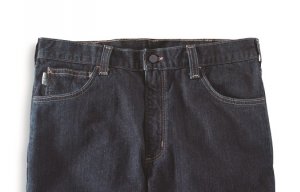
Mount Vernon FR extends FlexTex line of stretch fabrics
Global apparel retailer Gap has announced an initiative to produce denim using a waterless, indigo foam-dyeing technique.

5th August 2019
Innovation in Textiles
|
San Francisco, CA
The Banana Republic denim with Dry Indigo will be available for both men and women in Spring 2020. © Gap
Global apparel retailer Gap has announced an initiative to produce denim using a waterless, indigo foam-dyeing technique, starting with a partnership between Banana Republic and Spanish denim mill, Tejidos Royo. The innovative new process, called Dry Indigo, can reduce water usage by up to 99%, while also using 89% less chemicals, reducing energy usage by 65%, and eliminating water discharge when compared to the traditional slasher indigo (or sheet dyeing) process.
“Leveraging this revolutionary new dyeing process directly supports Gap Inc.’s manufacturing goal to conserve 10 billion litres of water by the end of 2020, as well as Banana Republic’s recently unveiled sustainability goals to produce eco-friendly denim, reduce water impact and promote cleaner chemistry,” said Christophe Roussel, Gap’s EVP of Global Sourcing. “Tejidos Royo is a trusted partner and true pioneer in sustainable innovation. We are thrilled to work with them on this exciting new venture and have no doubt that this will change the future of denim manufacturing.”
Utilising a foam dye that adheres to yarn, the Dry Indigo technique produces a denim fabric that is comparable in hand-feel, aesthetic, performance, and washability to traditionally dyed denim. The Banana Republic denim with Dry Indigo will be available through a special collection for both men and women in Spring 2020.
Both lines will include selectively sourced and sustainable pocketing and trims, such as 100% Global Recycle Standard (GRS) certified recycled poly zipper tape. The manufacturing will be done at Saitex – a state-of-the-art sustainable factory that recycles 98% of the water it uses.
Currently, the Dry Indigo process is exclusive to Tejidos Royo, and Banana Republic is one of the first brands to pilot the technology. Creating the ground-breaking process required ten years of collaborative research with Gaston Foam Systems and Indigo Mills Designs before its launch. The foam-dyeing technique occurs in a space of less than 65 feet – compared to the hundreds of feet that is typically necessary for a traditional dyeing machine – thereby significantly reducing energy needs.
The apparel industry is one of the largest and most intensive users of water. In response, Gap has worked closely with supply chain partners to implement numerous water-saving initiatives. In 2016, Gap brand introduced Washwell, a smart denim wash program that has enabled the company to save over 229 million litres of water, compared to conventional wash methods. The company recently announced it has saved 5.7 billion litres of water through combined efforts so far. Banana Republic says it is excited to adopt the Washwell programme in 2020.
Earlier this month, Gap announced that it will derive 100% of its cotton – across all brands – from sustainable sources by 2025. The initiative will include sourcing cotton from the Better Cotton Initiative (BCI) that is organic, recycled, and verified as American or Australian grown. In addition, Gap CEO Art Peck recently announced that Old Navy, Gap, and Banana Republic are launching denim with 5% post-consumer mechanically recycled cotton content.
Gap and Old Navy will launch their recycled cotton denim in Holiday 2019, while Banana Republic will launch in Spring 2020.

Business intelligence for the fibre, textiles and apparel industries: technologies, innovations, markets, investments, trade policy, sourcing, strategy...
Find out more